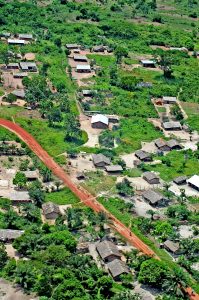
Conservation provides employment for local inhabitants at Dzanga Ndoki National Park, Central African Republic. ©Peter Prokosch, http://www.grida.no/resources/1516
Many centuries ago, a Greek philosopher noted that change is the only constant in life.
And change is brought about, in many instances, through discourse.
Discourse has been described in part as: “an ensemble of ideas, concepts and categories through which meaning is given to social and physical phenomena…”
According to this definition, discourse refers to a particular set of related ideas, which are shared, debated and communicated using different formats.
Through various discourses, we can discover fresh information and be introduced to new and different perspectives. We are able to gain experience and insight. As a result, our thinking, our attitudes, and our approaches toward various issues can evolve and change.
Certainly the ways in which forests are viewed, managed and developed have changed as the discourses concerning them have evolved.
And, in terms of forest development discourses, there have been, and are, some diverse and even contrasting discourses. As an example: where power over forest resources resides with the state, there has been a discourse that identified some forest-dwelling communities as antiquated destroyers of national forest resources. On the other hand, a discourse that takes a more local/indigenous perspective, acknowledges that indigenous and local communities have in many cases managed forest resources sustainably.
So, what happens as these – and other – discourses morph over time? How does the weight and balance of influence shift and what does it mean to forest development?
The Special Issue of the International Forestry Review: Shifting global development discourses – Implications for forests and livelihoods takes a closer look at forestry discourses, and specifically how they have affected forest-based development.
Collectively, the papers in the Special Issue reflect changes in societal demands on forests and forest landscapes, changes in how multiple constituencies compete for forest goods and services (forest ecosystem services), and how these changes are influencing forest governance and policies in multiple international, national, sub-national and local contexts.
Forestry discourses have been debated and discussed since the 1960s and have, over the years, been linked to notions of industrial forests, wood fuel, forest decline, forest parks, deforestation, degradation, sustainable forest management, forest-related traditional knowledge, and biodiversity conservation. They have also been instrumental in the process of building wider discourses and narratives with regard to sustainable development, and recently on climate change mitigation and adaptation.
“The Special Issue was developed by the IUFRO Special Project World Forest, Society and Environment (WFSE), and within this project we focus on issues important in the forests-society interface. The project aims to support sustainable forest-based development by producing and synthesizing scientific knowledge about these issues,” said Dr. Pia Katila of the Natural Resources Institute Finland (Luke) and coordinator of IUFRO WFSE. Dr. Katila is also one of the contributors to the Special Issue.
WFSE focuses on topics recognised by the scientific community as important and having significant policy implications but appear not to be receiving adequate attention from the policy community.
“Discourses are, in many ways, the essence of policy-making,” said Dr. Katila. “They can include both the forms of communication and the content that is communicated. So, they can reflect how societal problems, for example, are understood, what are the causes of the problems, who is responsible and what should be done to solve the problems,” she said.
Dr. Katila added: “Discourses convey how and what issues are ‘talked about’, how they are understood and expressed by different actors, and which are considered important”. The papers in this Special Edition address forest discourses that reflect the dominating international forest debates.
“As such,” she said, “the publication is relevant for scientists and students who are interested in forest policy in general and discourses in particular. It should also be of interest to policy-makers, as the papers show how discourses are understood differently in different contexts, and-or by different actors”.
“With global trends such as population growth, urbanization and climate change, there are increasing, changing and diversified demands for forests. There is, for instance, an increasing demand for traditional forest products, but especially for forest ecosystem services such as climate regulation, erosion control and water purification or for forests as an important environment for recreation,” she said.
“We hope that the papers in this special issue can, among other things, make policy makers more aware of those different understandings, where they come from and how they are used or supported to influence policy making.”
The Special Issue of the International Forestry Review can be found at:
http://www.ingentaconnect.com/content/cfa/ifr/2017/00000019/a00101s1;jsessionid=15palhg7ydfpo.x-ic-live-01
More about Special Project on World Forests, Society and Environment (IUFRO-WFSE):
https://www.iufro.org/science/special/wfse/
View all IUFRO Spotlights at http://www.iufro.org/media/iufro-spotlights/

Leave a Reply